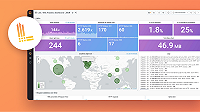Caution
Grafana Agent has reached End-of-Life (EOL) on November 1, 2025. Agent is no longer receiving vendor support and will no longer receive security or bug fixes. Current users of Agent Static mode, Agent Flow mode, and Agent Operator should proceed with migrating to Grafana Alloy. If you have already migrated to Alloy, no further action is required. Read more about why we recommend migrating to Grafana Alloy.
Important: This documentation is about an older version. It's relevant only to the release noted, many of the features and functions have been updated or replaced. Please view the current version.
Configure Grafana Agent
Grafana Agent is configured across two places:
- A YAML file
- Command-line flags
The YAML file is used to configure settings which are dynamic and can be changed at runtime. The command-line flags then configure things which cannot change at runtime, such as the listen port for the HTTP server.
This file describes the YAML configuration, which is usually in a file named agent.yaml.
The configuration of Grafana Agent is “stable,” but subject to breaking changes as individual features change. Breaking changes to configuration will be well-documented.
Updating configuration
The configuration file can be reloaded at runtime using the /-/reload API
endpoint or sending a SIGHUP signal to the process.
Variable substitution
You can use environment variables in the configuration file to set values that
need to be configurable during deployment. To enable this functionality, you
must pass -config.expand-env as a command-line flag to the Agent.
To refer to an environment variable in the config file, use:
${VAR}Where VAR is the name of the environment variable.
Each variable reference is replaced at startup by the value of the environment variable. The replacement is case-sensitive and occurs before the YAML file is parsed. References to undefined variables are replaced by empty strings unless you specify a default value or custom error text.
To specify a default value, use:
${VAR:-default_value}Where default_value is the value to use if the environment variable is undefined. The full list of supported syntax can be found at Drone’s envsubst repository.
Regex capture group references
When using -config.expand-env, VAR must be an alphanumeric string with at
least one non-digit character. If VAR is a number, the expander will assume
you’re trying to use a regex capture group reference, and will coerce the result
to be one.
This means references in your config file like ${1} will remain
untouched, but edge cases like ${1:-default} will also be coerced to ${1},
which may be slightly unexpected.
Reloading (beta)
The configuration file can be reloaded at runtime. Read the API documentation for more information.
This functionality is in beta, and may have issues. Please open GitHub issues for any problems you encounter.
File format
To specify which configuration file to load, pass the -config.file flag at
the command line. The file is written in the YAML
format, defined by the scheme below.
Brackets indicate that a parameter is optional. For non-list parameters the
value is set to the specified default.
Generic placeholders are defined as follows:
<boolean>: a boolean that can take the valuestrueorfalse<int>: any integer matching the regular expression[1-9]+[0-9]*<duration>: a duration matching the regular expression[0-9]+(ns|us|µs|ms|[smh])<labelname>: a string matching the regular expression[a-zA-Z_][a-zA-Z0-9_]*<labelvalue>: a string of unicode characters<filename>: a valid path relative to current working directory or an absolute path.<host>: a valid string consisting of a hostname or IP followed by an optional port number<string>: a regular string<secret>: a regular string that is a secret, such as a password
Support contents and default values of agent.yaml:
# Configures the server of the Agent used to enable self-scraping.
[server: <server_config>]
# Configures metric collection.
# In previous versions of the agent, this field was called "prometheus".
[metrics: <metrics_config>]
# Configures log collection.
# In previous versions of the agent, this field was called "loki".
[logs: <logs_config>]
# Configures Traces trace collection.
# In previous versions of the agent, this field was called "tempo".
[traces: <traces_config>]
# Configures integrations for the Agent.
[integrations: <integrations_config>]Remote Configuration (Experimental)
An experimental feature for fetching remote configuration files over HTTP/S can be
enabled by passing the -enable-features=remote-configs flag at the command line.
With this feature enabled, you may pass an HTTP/S URL to the -config.file flag.
The following flags will configure basic auth for requests made to HTTP/S remote config URLs:
-config.url.basic-auth-user <user>: the basic auth username-config.url.basic-auth-password-file <file>: path to a file containing the basic auth password
Note that this beta feature is subject to change in future releases.



